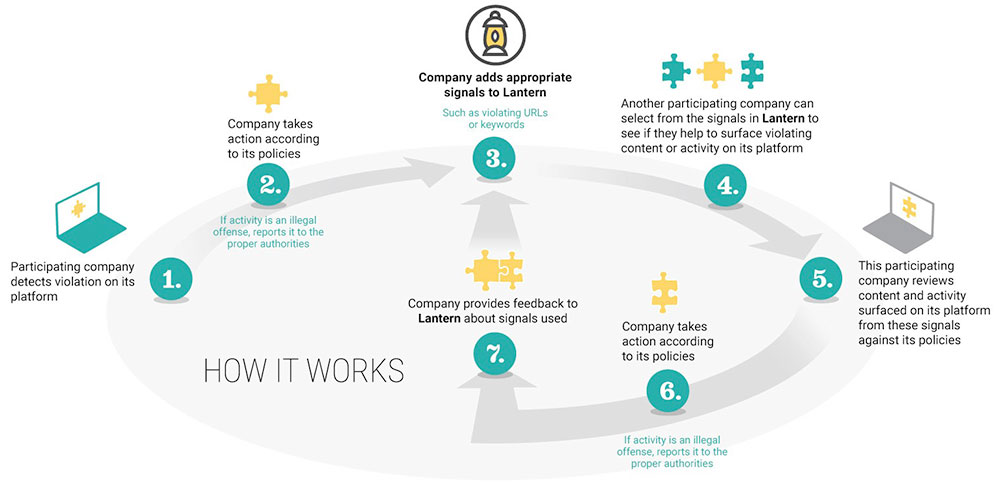A new initiative to better identify child predators who obscure their activity by jumping among tech platforms was announced Tuesday by The Tech Coalition, an industry group that includes Discord, Google, Mega, Meta, Quora, Roblox, Snap, and Twitch.
The initiative, called Lantern, allows companies in the coalition to share information about potential child sexual exploitation, which will increase their prevention and detection capabilities, speed up the identification of threats, build situational awareness of new predatory tactics, and strengthen reporting to authorities of criminal offenses.
In a posting on the coalition’s website, Executive Director John Litton explained that online child sexual exploitation and abuse are pervasive threats that can cross various platforms and services.
Two of the most pressing dangers today are inappropriate sexualized contact with a child, referred to as online grooming, and financial sextortion of young people, he continued.
“To carry out this abuse, predators often first connect with young people on public forums, posing as peers or friendly new connections,” he wrote. “They then direct their victims to private chats and different platforms to solicit and share child sexual abuse material (CSAM) or coerce payments by threatening to share intimate images with others.”
“Because this activity spans across platforms, in many cases, any one company can only see a fragment of the harm facing a victim,” he noted. “To uncover the full picture and take proper action, companies need to work together.”
Here’s how the Lantern program works:

“Until now, no consistent procedure existed for companies to collaborate against predatory actors evading detection across services,” Litton wrote. “Lantern fills this gap and shines a light on cross-platform attempts at online child sexual exploitation and abuse, helping to make the internet safer for kids.”
“This initiative holds immense significance in forging a path towards industry-wide collaboration to combat child sexual exploitation and abuse,” observed Alexandra Popken, vice president of trust and safety at WebPurify, a cloud-based web filtering and online child protection service in Irvine, Calif.
“Each platform faces its unique set of challenges, whether related to knowledge, tools, or resources, in addressing the escalating issue of CSAM,” she told TechNewsWorld. “Lantern symbolizes a unity among platforms in combating this issue and offers the practical infrastructure needed to pull it off.”
Lantern builds on the existing work of tech companies sharing information with law enforcement, added Ashley Johnson, a policy analyst with the Information Technology and Innovation Foundation, a research and public policy organization in Washington, D.C.
“Hopefully, we will see this kind of collaboration for other purposes,” she told TechNewsWorld. “I can see something like this being useful for combating terrorist content, as well, but I think online chat sexual abuse is a great place to start with this kind of information sharing.”
Popken explained that malicious actors weaponize platforms through a range of tactics, employing various strategies to evade detection.
“In the past, platforms were hesitant to signal-share as it would imply an admission of exploitation,” she said. “However, initiatives like this demonstrate a shift in mindset, recognizing that cross-platform sharing ultimately enhances collective security and safeguards users’ well-being.”
Online predators use multiple platforms to contact and groom minors, meaning each social network only sees a portion of the predators’ evil actions, explained Chris Hauk, a consumer privacy champion at Pixel Privacy, a publisher of consumer security and privacy guides.
“Sharing information among the networks means the social platforms will be better armed with information to detect such actions,” he continued.
“Currently, when a predator is shut down on one app or website, they simply move on to another platform,” he said. “By sharing information, social networks can work to put a stop to this type of activity.”
Johnson explained that in cases of online grooming, it’s very common for perpetrators to have their victims move their communication off one site and onto another.
“A predator may suggest moving to another platform for privacy reasons or because it has fewer parental controls,” she said. “Having communication to track that activity across platforms is extremely important.”
Lantern’s potential to speed up the identification of threats to children is a critical aspect of the program. “If data uploaded to Lantern can be scanned against other platforms in real time, auto-rejecting or surfacing content for review, that represents meaningful progress in enforcing this problem at scale,” Popken noted.
Litton pointed out in his posting that during the two years it has taken to develop Lantern, the coalition has not only designed the program to be effective against online child sexual exploitation and abuse but also to be managed responsibly via:
“Any data sharing requires privacy to be top of mind, especially when you’re dealing with information about children because they’re a vulnerable population,” Johnson said.
“It is important for the companies that take part in this to protect the identities of the children involved and protect their data and information from falling into the wrong hands,” she continued.
“Based on what we’ve seen from tech companies,” she said. “They’ve done a pretty good job of protecting victims’ privacy, so hopefully they’ll be able to keep that up.”
However, Paul Bischoff, privacy advocate at Comparitech, a reviews, advice, and information website for consumer security products, cautioned, “Lantern won’t be perfect.”
“An innocent person,” he told TechNewsWorld, “could unwittingly trigger a ‘signal’ that spreads information about them to other social networks.”

Explore our curated content, stay informed about groundbreaking innovations, and journey into the future of science and tech.
© ArinstarTechnology
Privacy Policy